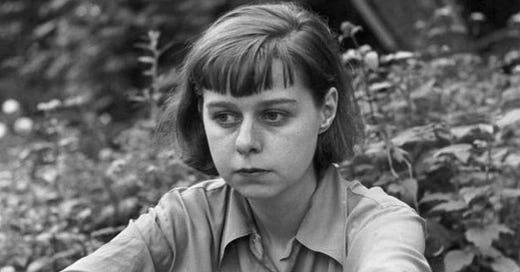Carson McCullers died on this day in 1967.
She was one of the great American writers of the 20th century. At the young age of 23 and the release of her first novel, The Heart Is a Lonely Hunter, the critics hailed her as the new Steinbeck. Her friend, Tennessee Williams, proclaimed her, in his dramatic fashion, the greatest living writer of our country, if not of the world.
Despite her literary success, McCullers' life was marked by deep unhappiness and ongoing health struggles. Yet, through it all, her drive to create never dimmed. Her stories cut straight to the core of the human experience with a rare kind of brilliance.
I remember the first time I read The Heart Is a Lonely Hunter—it was about 15 years ago. I fell in love with her writing instantly. There was something hauntingly beautiful about her voice, a poetry to it that spoke right to the heart. She captured what it felt like to grow up in the South in a way no one else had. I can still picture myself on a hot summer afternoon, sitting in the cool shade of an old oak tree with a cold beer in hand, completely captivated by her words.
That novel stayed with me for weeks, haunting my thoughts long after I finished it.
May Sarton once said that when “one puts [this book] down, it is with… a feeling of having been nourished by the truth.” Indeed.
McCullers wrote about misfits, outcasts, and spiritually isolated characters living in the small, rural towns of the deep South. As one article put it: “Carson’s fictional characters tend to show physical or psychological handicaps, but with amazing compassion and warmth. Her stories show a Southern Gothic world, where she portrays the disparities between the lovers, longingness for love and human connection.”
The novelist James Wright praised McCullers’s ability “to rise above the pressures of her environment and embrace white and black humanity in one sweep of apprehension and tenderness.”
September 29, 1967, at the age of 50, McCullers died of a brain hemorrhage. She once wrote: “How can the dead be truly dead when they still live in the souls of those who are left behind?”
Below is a brief poem that Charles Bukowski wrote about this bereaved and dejected yet profound and compassionate Southern writer. Thanks for reading.
Carson McCullers
she died of alcoholism
wrapped in a blanket
on a deck chair
on an ocean
steamer.
all her books of
terrified loneliness
all her books about
the cruelty
of loveless love
were all that was left
of her
as the strolling vacationer
discovered her body
notified the captain
and she was quickly dispatched
to somewhere else
on the ship
as everything
continued just
as
she had written it
Thank you so much for reading. My work and research I put into this Substack Page are entirely reader-supported. If you enjoy the content I provide and are not ready to become a paid subscriber, you can simply make a one-time donation here at Buy Me A Coffee. If you can. I appreciate you all following this page. You’ve truly made it into a magical little online community. Thank You.






"The best people possess a feeling for beauty, the courage to take risks, the discipline to tell the truth, the capacity for sacrifice. Ironically, their virtues make them vulnerable: they are often wounded, sometimes destroyed."
Ernest Hemingway
Thank you. She was one of the many wonderful female Southern writers of that era. They include Flannery O'Connor, Katherine Anne Porter (do yourselves a favor and read "Ship of Fools"), Patricia Highsmith and my personal favorite, Eudora Welty. Welty wrote the funniest short story ever: "Why I live at the P.O." Just google and get it for free. Trivia fact, the writer Richard Ford grew up across the street from Welty in Jackson, Mississippi.